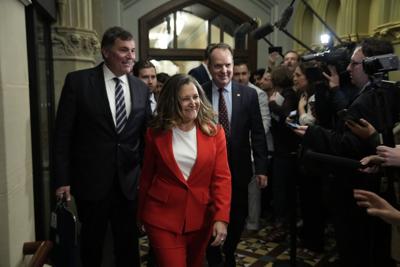Chrystia Freeland has a history of being in the right place at the right time.
In 1991, as the Soviet Union was collapsing, she postponed a Master’s degree at Oxford University and instead cut her teeth as a freelance journalist in Kyiv. Within months of Freeland’s arrival, Ukrainians voted overwhelmingly for independence, and she found herself witnessing the birth of a new nation — an outcome her Ukrainian maternal grandparents had dreamed about but never thought possible. At 23, Freeland quickly established herself as the go-to stringer for editors at international outlets such as The Financial Times and The Washington Post. “She was the person who should have been in Kyiv for that moment in history,” says Daniel Franklin, The Economist’s Europe editor at the time. “She rose to it, as well as she possibly could have done. The energy, the talent, the Ukrainian-speaking-ness, the sense of the scale of what was going on — all of these were just perfect for the time.”
Two decades later, as a senior business journalist in Manhattan, timing was also on Freeland’s side. Her meteoric career rise had plateaued somewhat, and she had a nagging feeling it was time to come home to Canada. By chance, one of her many talks on the international conference circuit was attended by Katie Telford, who would soon go on to become Justin Trudeau’s campaign manager as he sought and won the leadership of the Liberal party. In 2013, after months of being pursued by Trudeau and his team, Freeland gambled big, moving her young family from New York to şŁ˝ÇÉçÇřąŮÍřto run in a şŁ˝ÇÉçÇřąŮÍřCentre byelection, the Liberals still in third place in the House of Commons. The gamble paid off in spades when, in 2015, Trudeau led the Liberals to a historic majority, and Freeland was given the first of many high-profile cabinet posts.
From a very young age, friends and family say, Freeland has had a great ambition to do, rather than an ambition to be. She also understood early on that in order to be able to effect any sort of powerful, lasting change, she would need to be in the room where things happen. “This is what is fun for her — to be in the thick of things, making stuff happen,” says her younger sister Natalka.
Throughout Freeland’s decade as a cabinet minister for Justin Trudeau, she worked her way up from international trade to foreign affairs to finance, which, according to Natalka, was always Freeland’s ultimate prize. She enjoyed being able to deliver for the Trudeau government while also working towards goals that she was passionate about: for example, countering Vladimir Putin’s incursion into Ukraine, or securing free trade agreements that she believed would benefit Canada, or rolling out a national child care program to make it easier for women to work outside the home.
Last year, though, fissures finally began showing in Freeland and Trudeau’s previously solid relationship, culminating in Freeland’s shocking resignation, which in turn led to Trudeau’s.
No doubt certain that this was her moment, Freeland threw her hat in the ring for the top job — the next logical move for the most powerful female politician in Canada. But it wasn’t to be this time, and in came Prime Minister Mark Carney, untainted by any significant connection to Trudeau. Freeland, a family friend, was sworn in as his minister for transport and internal trade.
The fact that Carney gave Freeland a cabinet post at all, when it would have been easier to cut such an obvious tie to the previous Liberal government, speaks to his faith in her abilities. But since the spring, it has been clear that Freeland is not a trusted member of Carney’s inner circle — that she is outside of the room where things happen, looking in. Though she wouldn’t care — she never Googles herself — the former “Minister of Everything” has scarcely been in the headlines these past few months.
So what we saw this week — Freeland’s cordial resignation from cabinet, her advance notice that she won’t be running in the next election and her appointment, in the interim, as Canada’s new special representative for the reconstruction of Ukraine — is really the best exit she could have hoped for. And, of course, it’s not to say that she has given up on her prime ministerial aspirations; she could very well end up following a path similar to the late John Turner, another finance minister who resigned in dramatic fashion from a Trudeau government. After a few years practicing law, Turner returned to federal politics, winning the Liberal leadership after Pierre Trudeau’s resignation and becoming prime minister.
But more so than any other Canadian politician, she understands, lives and breathes Ukraine and its history. She ran point on the Trudeau government’s response to Putin’s war in Ukraine, maintaining close ties with top Ukrainian officials, and is recognized internationally as one of the leading figures co-ordinating Western countries’ sanctions on Russia. She has proven herself to be fearless when it comes to standing up to authoritarian despots. And, crucially, as her sister Natalka says, she is “one hundred per cent convinced” that Ukraine will win in the end.
As in the early 1990s, Freeland is the person who should be doing the job.
Whether the time before the next election will afford her the opportunity to make any sort of significant impact remains to be seen, but you can bet it’s exactly where she wants to be right now.
Error! Sorry, there was an error processing your request.
There was a problem with the recaptcha. Please try again.
You may unsubscribe at any time. By signing up, you agree to our and . This site is protected by reCAPTCHA and the Google and apply.
Want more of the latest from us? Sign up for more at our newsletter page.



























To join the conversation set a first and last name in your user profile.
Sign in or register for free to join the Conversation